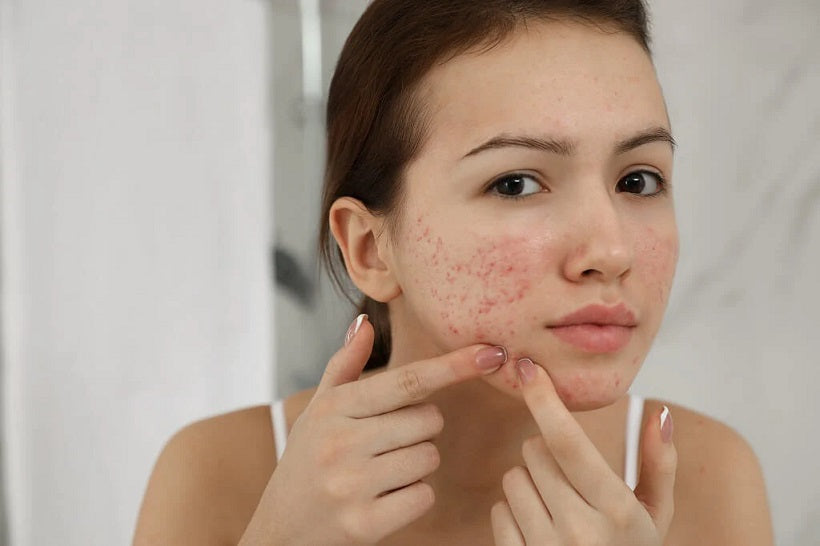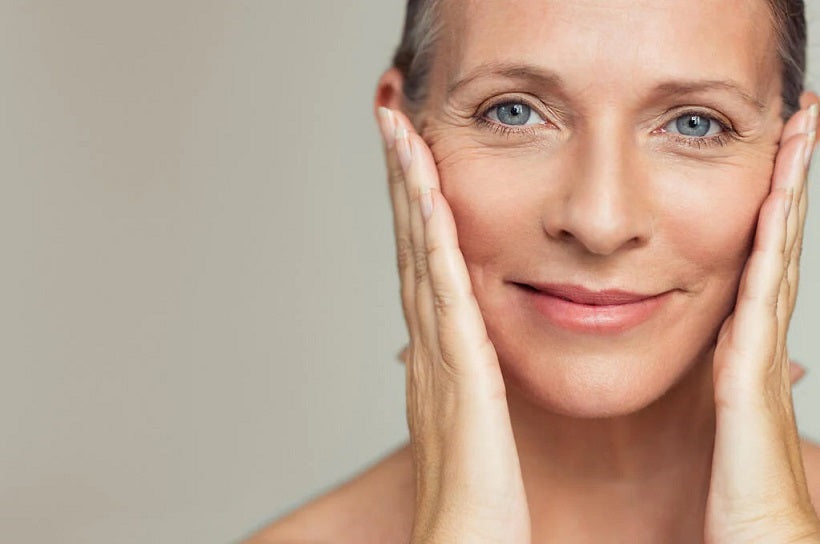Acne & Self-Esteem
By Renee Grandi

Acne vulgaris and rosacea can have a profound negative impact on one’s self-esteem, quality of life and sense of identity. The psychological influences of this condition are debilitating and can trigger anxiety, social phobia, depression and relationship issues. Adolescent and adult acne are now very common conditions, yet the underlying associated mental health decline is often misunderstood or dismissed.
Research has identified that people who have acne have significantly increased social phobias, avoidant personality disorders and even suicidal thoughts. People suffering from acne can completely retreat from family, friends, as well as partners. Studies show that many may even call in sick for work or stop working altogether.
If you or your child has acne, it’s important to reach out for help. If your teen is suffering from acne, be sure not to dismiss their concerns or feelings. Do not comment on their skin and make it a point to be as kind as possible – their thoughts and feelings may be very fragile.

Skin issues can cause strains on relationships as some may not understand how deeply rooted the self-criticism lies beneath. Many women will cover their blemishes with foundation, going so far as to only wearing make-up in front of others and further clogging pores. Others may find themselves avoiding mirrors or constantly developing negative thoughts about themselves.
Humans are social creatures and rely on connections, leisurely activities and social gatherings for optimal quality of life. Feelings of inadequacy surrounding such essential areas of life can lead to immense feelings of loneliness, stigmatization and desperation. Does this sound like you?
You are not alone. Skin can heal.
Acne is a chronic condition that seems to be difficult to find answers to heal. Often conventional treatments will work in the short-term; however, the acne tends to return with a vengeance or with significant side effects.
Unfortunately, the stress associated with acne can increase cortisol production, further exacerbating the condition due to dysregulated blood sugars and chronic inflammation. Chronic skin conditions can leave people vulnerable to protracted levels of emotional suffering, especially anger. It can be debilitating. Intimate and sexual relationships can also be impaired by the condition, with a study showing 66.7% of females suffered from decreased intimate connections and sexual distress with their partners due to acne-induced low self-esteem.
Self-esteem is defined as “the reasonable or justifiable sense of one’s worth or importance.”
Acne is a multifactorial condition requiring comprehensive analysis into why the condition has manifested. Often, it will require a holistic and targeted approach to healing.

Factors that can unknowingly trigger or manifest acne
- Hormones, especially high testosterone levels
- PCOS
- Underlying bacterial or fungal overgrowths
- Digestive insufficiencies (low hydrochloric acid, bile, digestive enzyme secretion)
- Food intolerances or intestinal inflammation
- Insufficient liver metabolism
- Imbalanced gut bacteria ratios
- Dysregulated blood sugars or increased consumption of processed/oily foods, sugars or carbohydrates
- Regular alcohol, drug or tobacco intake
- Chronic long-term stress or trauma
- Depleted nutrients, especially Vitamins A, D, E, and C, as well as the minerals selenium and zinc
- Chronic long-term inflammation
- Unaddressed medical conditions
So what now? How do you heal acne? Well, you investigate. Do the tests. Find the imbalance. Give your body so much care, attention and self-love it has no other choice but to heal.
Top 10 ways to holistically support acne
- Work on gut health and intestinal integrity.
- Irradiate any underlying pathogens with natural anti-fungal, anti-bacterial and anti-inflammatory herbs and foods.
- Implement a wholefood, low GI diet which is alkaline and rich in antioxidants.
- Increase skin-loving superfoods every single day and ensure adequate amounts of zinc, vitamin A, selenium, vitamin C and omega-3 essential fatty acids in your diet. Try our 8-week hormonal balancing program
- Avoid inflammatory foods.
- Work on stress. Find something that you thoroughly enjoy doing and makes you happy (painting, sports, dancing, reading, swimming, being with friends). Do it often.
- Supplement specifically for your underlying conditions so you are targeting your imbalances. Google doesn’t know your individual health.
- Keep sweating! Try going to a sauna 2 to 3 times per week or do hot yoga, hydrotherapy or a great 30-minute HIIT class.
- Remember to love thyself! Curb that nasty voice straight away with positive affirmations like “I’m working on it”, “I’m worthy”, “I’m lovable”, “My skin does not define my worth”.
- Seek professional guidance from a naturopath, nutritionist or counsellor to support your journey so you are on a direct healing path.
Final thoughts
I wish that there was a ‘one-size-fits-all’ approach to acne, but you’re unique and so are your imbalances. People manifest this condition for various reasons. If you’re suffering from acne and aren’t sure what to do next, I would highly recommend booking into our online clinic and consulting with a nutritionist or naturopath. A practitioner will meticulously evaluate your health, history and all things in-between to provide you with answers, a treatment protocol and high-quality natural supplements.
Acne can be nourished and supported. It might feel awful right now, but you will get there. For now, focus on positive self-talk and what you can do to make some healing changes in your diet and lifestyle.
REFERENCES
Beisert M, Pilarczyk K, Zakrzewska M, Pawlaczyk M. (2019). Sexual satisfaction and self‐esteem in women with acne. Journal of Cosmetic Dermatology. 06 Nov.
https://doi.org/10.1111/jocd.13207
Gallitano SM & Berson DS. (2018). How Acne Bumps Cause the Blues: The Influence of Acne Vulgaris on Self-Esteem. International Journal of Women’s Dermatology. Mar; 4(1): 12–17.
https://dx.doi.org/10.1016%2Fj.ijwd.2017.10.004
Nguyen CM, Koo J, Cordoro KM. (2016). Psychodermatologic Effects of Atopic Dermatitis and Acne: A Review on Self-Esteem and Identity. Pediatric Dermatology. Mar-Apr;33(2):129-35.
https://doi.org/10.1111/pde.12802
Tugnoli et al. (2020). Anger, Emotional Fragility, Self-esteem, and Psychiatric Comorbidity in Patients with Hidradenitis Suppurativa/Acne Inversa. Journal of Clinical Psychology in Medical Settings. Sep;27(3):527-540.
https://doi.org/10.1007/s10880-019-09640-4









Leave a comment
This site is protected by hCaptcha and the hCaptcha Privacy Policy and Terms of Service apply.